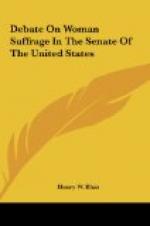At present the man represents the family in meeting the demands of the law and of society upon the family. So far as the rougher, coarser duties are concerned, the man represents the family, and the individuality of the woman is not brought into prominence; but when the ballot is placed in the hands of woman her individuality is enlarged, and she is expected to answer for herself the demands of the law and of society on her individual account, and not as the weaker member of the family to answer by her husband. This naturally draws her out from the dignified and cultivated refinement of her womanly position, and brings her into a closer contact with the rougher elements of society, which tends to destroy that higher reverence and respect which her refinement and dignity in the relation of wife and mother have always inspired in those who approached her in her honorable and useful retirement.
When she becomes a voter she will be more or less of a politician, and will form political alliances or unite with political parties which will frequently be antagonistic to those to which her husband belongs. This will introduce into the family circle new elements of disagreement and discord which will frequently end in unhappy divisions, if not in separation or divorce. This must frequently occur when she becomes an active politician, identified with a party which is distasteful to her husband. On the other hand, if she unites with her husband in party associations and votes with him on all occasions so as not to disturb the harmony and happiness of the family, then the ballot is of no service as it simply duplicates the vote of the male on each side of the question and leaves the result the same.
Again, if the family is the unit of society, and the state is composed of an aggregation of families, then it is important to society that there be as many happy families as possible, and it becomes the duty of man and woman alike to unite in the holy relations of matrimony.
As this is the only legal and proper mode of rendering obedience to the early command to multiply and replenish the earth, whatever tends to discourage the holy relation of matrimony is in disobedience of this command, and any change which encourages such disobedience is violative of the Divine law, and can not result in advantage to the state. Before forming this relation it is the duty of young men who have to take upon themselves the responsibilities of providing for and protecting the family to select some profession or pursuit that is most congenial to their tastes, and in which they will be most likely to be successful; but this can not be permitted to the young ladies, or if permitted it can not be practically carried out after matrimony.
As it might frequently happen that the young man had selected one profession or pursuit, and the young lady another, the result would be that after marriage she must drop the profession or pursuit of her choice, and employ herself in the sacred duties of wife and mother at home, and in rearing, educating, and elevating the family, while the husband pursues the profession of his choice.




